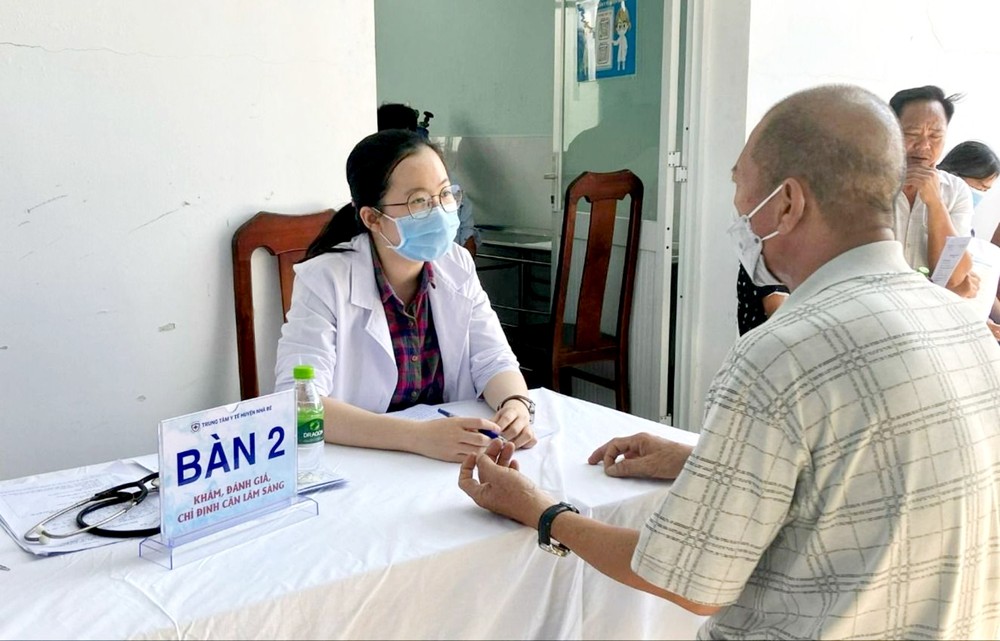
According to the Ministry of Health, the average life expectancy in Vietnam is relatively high at 73.6 years; however, the average number of healthy years is only around 65.4. Currently, many older adults in the country face a “double disease” burden—managing both chronic illnesses such as hypertension, diabetes, coronary artery disease, osteoarthritis, and cancer, as well as age-related syndromes like cognitive decline, confusion, depression, and memory loss.
Speaking on a recent meeting, Deputy Head Lu Mong Thuy Linh of the Medical Affairs Department of the Ho Chi Minh City Department of Health reported that in 2024, the city's health sector conducted examinations on 327,552 elderly residents accounting for 29.5 percent. She highlighted that a significant proportion of this population faces the burden of multimorbidity, characterized by the cumulative effects of chronic non-communicable diseases such as cardiovascular disease, diabetes, cancer, osteoporosis, dementia, and an elevated risk of functional decline, treatment complications, polypharmacy, and diminished quality of life.
According to Associate Professor Nguyen Van Tan, Head of the Department of Geriatrics at the University of Medicine and Pharmacy in Ho Chi Minh City, the disease profile among the elderly has shifted from infectious diseases to chronic non-communicable conditions, such as cardiovascular disease, diabetes, and mental disorders. These chronic illnesses not only cause functional decline, but also increase the risk of disability, vision loss, hearing loss, and chronic pain - all of which negatively impact the quality of life for senior citizens.
Furthermore, health care costs for this old population group are 7-8 times higher than for children, creating a significant financial burden, especially in poor households and remote areas.
Elderly persons often lack awareness of healthcare options and preventive measures for common conditions like high blood pressure and osteoarthritis. This lack of knowledge increases their risk of developing and progressing to more serious chronic illnesses.
Head Pham Chanh Trung of the Population Department under the Ho Chi Minh City Department of Health noted that, on average, each elderly person suffers from more than two non-communicable diseases requiring lifelong treatment. These health conditions significantly impact their mental well-being, daily functioning, and ability to integrate into the community.
Moreover, access to comprehensive health care and counseling services for the elderly remains limited, and the health care system has yet to adequately respond to the accelerating pace of population aging.
Head Pham Chanh Trung observed that current healthcare activities for the elderly remain fragmented, isolated, and lack systematic integration with other relevant programs.
He further enalyzed specific deficiencies including the absence of adequate home care services, insufficient attention and development of human resources dedicated to geriatric healthcare, suboptimal quality of elderly care, and a lack of funding for healthcare initiatives targeting older adults living independently within the community.
In response to this situation, medical experts emphasize the need to strengthen and enhance the capacity of the grassroots health system to effectively deliver primary health care, disease prevention, and elderly care services.
At the same time, efforts should be directed toward gradually developing a long-term care model tailored to the elderly. Experts also recommend prioritizing the implementation of annual general health check-up programs, establishing electronic health records for all elderly individuals, and building a comprehensive health database. Such a database would enable the identification of disease patterns among the elderly and support the development of realistic, data-driven health care policies.
At the same time, medical experts emphasized the development of a community-based health care network for the elderly. Volunteers and collaborators in the special community-based health care network for old people can participate in monitoring activities, support health care, and manage chronic diseases and non-communicable diseases of the elderly at home and in the community.
























